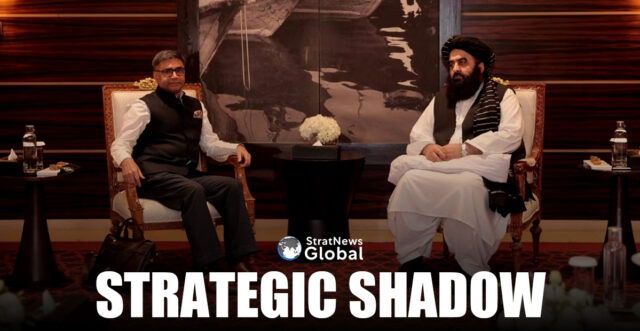Have tensions with Pakistan pushed Kabul closer to India?, runs the title of an article in the Dawn newspaper.
The article warns that “India may try to get its foot in the door and attempt to regain the space it previously lost in Afghanistan by deepening its strategic footprint through economic assistance, reconstruction and development projects and relief work.
“India will not spare any investment against Pakistan even if it involves support for TTP (Tehreek-e-Taliban) and BLA (Baloch Liberation Army) militants,” the article argued.
India’s strategic partnership with the US and its opposition to China means it will be only too happy to counter the Belt & Road Initiative as well as CPEC (China-Pak Economic Corridor).
The article quotes Prof Obaidullah Burhani, a California-based Afghan analyst as saying that Pakistan’s “policies such as supporting internal factions and direct interference in Afghan affairs have undermined mutual trust and deepened political divides.”
He claimed that India was leveraging this dynamic to expand its regional influence and counter Pakistan’s position.
The article reflected on the adversarial nature of ties between India and the Afghan Taliban dating back to the 1990s, “mainly due to the latter’s closeness to Pakistan at the time”.
It notes that “During the first Taliban regime from 1996 to 2001, India actually sheltered and supported the Northern Alliance of Mohammad Najibullah and Ahmed Shah Massoud in their efforts to oust the Taliban from power.”
During the NATO dominance of Afghanistan (2001-21) India “doubled down” on its anti-Taliban policies, making the gap between the two capitals seem unbridgeable. Cut to 2021 when India evacuated its embassy in Kabul as the Taliban swept in.
It quotes Mansoor Ahmed Khan, former Pakistani ambassador to Afghanistan as saying that the recent meeting of India’s Foreign Secretary Vikram Misri and Taliban Foreign Minister Amir Khan Muttaqi in Doha, have underscored the need for the Islamabad-Kabul gap to be bridged.
“For Pakistan, it’s important to work out its relations with Afghanistan based on the positive leverages the two neighbours and their peoples have with each other.”
But this is easier said than done. The article flagged disagreements over travel documents resulting in the Torkham and Chaman border crossings remaining shut for several days, causing discontent on both sides.
It noted that given Afghanistan’s dependence on trade through Pakistan, the closures hurt the former considerably.
Add to that nearly half a million ‘unregistered’ Afghan refugees were forced to return by Nov 2023, adding to the Taliban regime’s struggle to provide food and shelter. A second round of repatriation may target as many as many as a million more people.
Airstrikes by the Pakistan air force on two occasions have added to the bad blood although attempts to maintain a dialogue continue.
Thirty eight years in journalism, widely travelled, history buff with a preference for Old Monk Rum. Current interest/focus spans China, Technology and Trade. Recent reads: Steven Colls Directorate S and Alexander Frater's Chasing the Monsoon. Netflix/Prime video junkie. Loves animal videos on Facebook. Reluctant tweeter.





